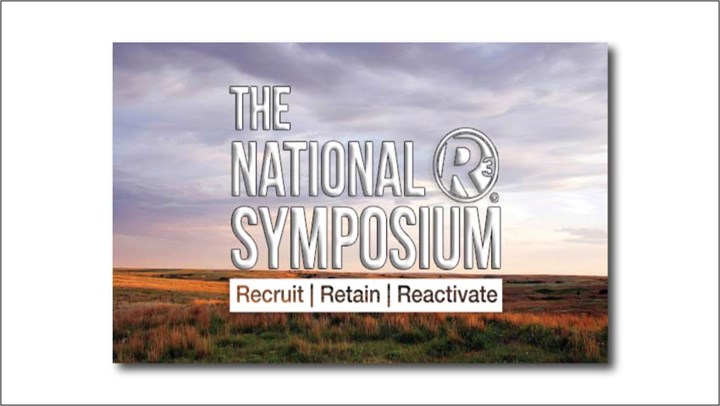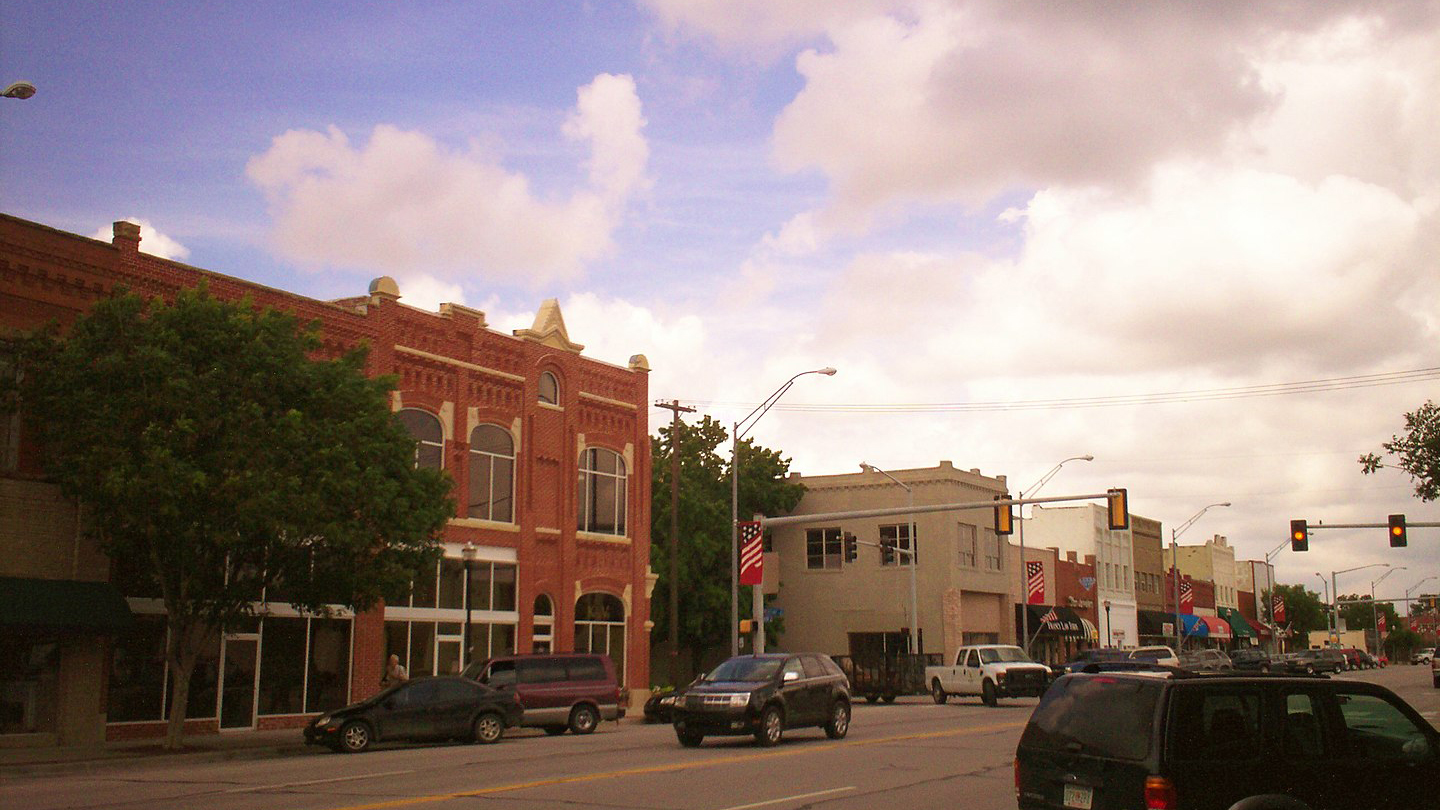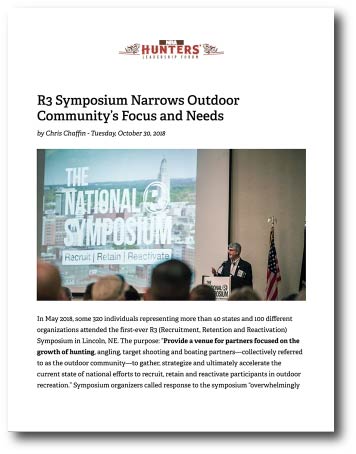
by Chris Chaffin - Wednesday, January 8, 2020

The effort to bolster America’s hunting population continues to gather steam, as demonstrated by the very existence of the National R3 (Recruit, Retain, Reactivate) Symposium, last conducted in May 2018. The 2020 National R3 Symposium will be held May 12-14 in Broken Arrow, Okla., so save the dates. If you are involved in hunting in any capacity, you need to be involved in the R3 movement. Let’s look at who participated in the last symposium and why they participated. It may help you find the right niche for your efforts to maintain and expand our hunting future.
Symposium organizers, most notably the Council to Advance Hunting and the Shooting Sports, made a concerted effort to include “all areas of outdoor recreation” at the meeting. And, as with all sound research efforts, the program sought to establish a baseline of data on who attended, what they brought to the effort and why they were there.

Hunting was the primary focus for attendees but angling was the group’s second area of interest, followed (distantly) by boating and target shooting. On the attendee’s survey, they could choose two or more options. The fact that 74.1 percent of them did so reflects “…that professionals are approaching R3 efforts for collective outdoor recreation, rather than specializing in one specific area." That's according to a report entitled "Results From the 2018 National R3 Symposium” prepared by the Council to Advance Hunting & the Shooting Sports and DJ Case & Associates.
State wildlife management agencies made up the bulk of attendees, and R3 efforts by individual states have been encouraging. However, a broad spectrum of outdoors-involved people participated, such as those from the National Rifle Association, National Shooting Sports Foundation, Archery Shooters Association, Rocky Mountain Elk Foundation, National Wild Turkey Federation, Pheasants Forever/Quail Forever, Recreational Boating and Fishing Foundation, Amateur Trapshooting Association, Vista Outdoors, Wildlife Management Institute and others.
By and large, the majority of participants consisted of professionals already involved in R3 work, like those holding R3 coordinator positions at their state wildlife agencies. But other outdoor educators and marketing/outreach professionals rounded out that majority, making up 58 percent of the group. The variety of professional disciplines and jobs represented at the symposium “…positively demonstrates an expansion in interest in R3 efforts beyond the R3, educator and marketing positions,” again according to the "Results From the 2018 National R3 Symposium" report.
Attendees also represented various levels of responsibility and leadership within the organizations for which they work.
Of those choosing to respond, 135 were male and 50 were female. Less than 10 percent of the respondents to this question reported an ethnicity or race other than Caucasian.
By category, the primary interests of the attendees were as follows, according to their survey responses:
Attendees shared their thoughts on the most important wish or expectation from the symposium, with a wide range of responses, including:

Strategy-related issues and questions were dominant in the survey, with many asking for “proven strategies and tactics” they could apply directly to their work. Respondents wanted action items, direction, next steps, strategy and a plan with clear objectives, metrics, tools and guidance to develop programs in their states. Techniques for evaluating efforts with effective post-data analysis of marketing and outreach programs were high on the list. Click here for a complete list.
In addition to the strategy-related questions, attendees sought specific and meaningful interaction on new ideas, education and a national strategy with coordination and collaboration, networking and partnering. A variety of miscellaneous topics were also brought up, such as funding, training, mentors, agency commitment and support, accountability and how to include land managers in the R3 effort.
Clearly, the National R3 Symposium attendees had varied backgrounds, a multiplicity of interests and a boatload of questions—and needs. But, they had a common objective and left with a better-defined focus on preserving the future of hunting and other traditional outdoor activities.
The detailed results of their collective work at the symposium will serve to strengthen their efforts, build new bridges upon which they can form new partnerships and reach out with new and improved R3 programs that will ultimately help bolster support for and participation in hunting.
For the individual hunter, state wildlife agency staff members and leaders at hunting clubs, hunting-related businesses and wildlife conservation foundations, this national effort and the agencies and organizations that were there should open doors of opportunity for you to get involved directly. Arrange a meeting with the R3 coordinator at your state wildlife agency or call the headquarters of your favorite non-government organization or species conservation group to ask if they have an R3 manager with whom you can connect. Ask what their needs are. Ask what you or your group can do. Then, just get to work and do it.
To stay abreast of hunting-related news on the local, national and international fronts, follow NRA Hunters' Leadership Forum on Twitter @HuntersLead.
About the Author: Chris Chaffin has been an outdoor communicator, educator and partnership manager for more than 40 years. On the national scene he has represented several prominent companies in the outdoor community and served two terms as treasurer of the Professional Outdoor Media Association (POMA), eventually taking on the roles of vice-president, president and chairman of the board. In 2007, he launched Chaffin Communications, Inc., a communications consulting company focusing on the outdoors. In 2012, with support from the Outdoor Adventure Dream Giveaway, Chaffin founded and currently manages the Outdoor Adventure Conservation Fund, a Florida non-profit established to encourage and facilitate more people participating in traditional outdoor activities.
E-mail your comments/questions about this site to:
[email protected]
Proudly supported by The NRA Foundation and Friends of NRA fundraising.
